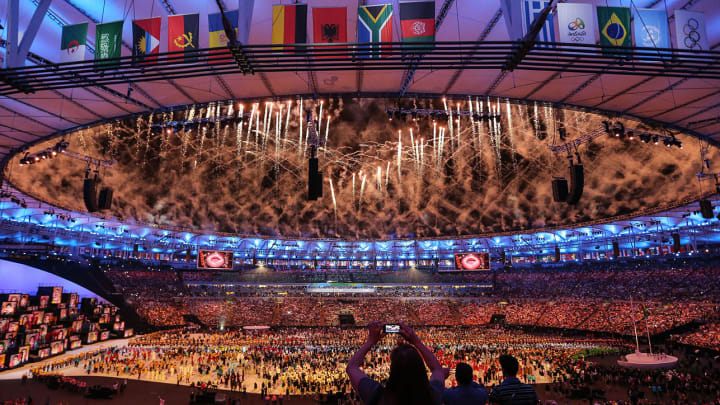Three thoughts on 2016 Rio Olympic Games opening ceremony

Three thoughts on the Rio Olympics opening ceremony:
1. The creative team for Rio’s opening ceremony set a goal of changing the paradigm from previous Olympic ceremonies—specifically, scaling down from costly productions featuring major electronic and mechatronic effects—and the pre-parade of nations part of the program Friday night at the famed Maracanã Stadium certainly accomplished that. The program highlighted the development of the forest, indigenous life, colonists’ arrival, influence of Africans (slaves) and other immigrants. One of my colleagues in Rio, editor Richard Demak, referred to the opening part of the ceremony as an ethnomusicologist’s dream, featuring the history and ongoing evolution of Brazilian music, from samba to hip hop. Also, give the Rio ceremony creative team credit for boldness: One hour into the program, the estimated one billion viewers from around the globe saw a series of maps showing the impact of climate change around the world including the melting of the polar ice caps and how rising sea levels will affect some coastal cities in the event of a temperature increase. The ceremony was a strong mix of joy and diversity, topped off by a stirring torch passing before Vanderlei Cordeiro de Lima, who led the Olympic marathon in 2004 in Athens at 19 miles when a spectator leaped from the crowd and attacked him, lit the Olympic cauldron. De Lima rebounded to finish with the bronze medal in that race and was later awarded the Pierre de Coubertin medal for sportsmanship.
2016 Rio Olympics opening ceremony
Fireworks explode over the Maracana stadium during the opening ceremony.
Michael Phelps of the United States carries the flag during the Opening Ceremony of the Rio 2016 Olympic Games at Maracana Stadium in Brazil.
Spain's flag bearer Rafael Nadal leads the delegation during the opening ceremony
Flag bearer Pita Nikolas Aufatofua of Tonga leads his Olympic Team
Supermodel Gisele Bundchen walks as The Girl From Ipanema during the Bossa segment during the Opening Ceremony
Dancers run during the opening ceremony
Former athlete Vanderlei de Lima lights the Olympic Flame after Pele pulled out with an illness.
The Olympic cauldron is lit during the Opening Ceremony of the Rio 2016 Olympic Games.
Dancers perform during the Opening Ceremony
Andy Murray of Great Britain carries the flag during the Opening Ceremony
Members of the Australia Olympic Team
Wayde Van Niekerk of South Africa carries his country's flag
Members of the South Korea Olympic team take part in the Opening Ceremony
Brazilian model Gisele Bundchen walks across the stage during the opening ceremony
Brazilian model Gisele Bundchen walks across the stage during the opening ceremony
Timo Boll of Germany carries his country's flag
Jia Lui of Austria carries her country's flag
Flag bearer Shelly-Ann Fraser-Pryce of Jamaica leads her Olympic team
Flag bearer Sheng Lei of the People's Republic of China leads his team during the Opening Ceremony
Members of the Brazil team take part during the Opening Ceremony
Flag bearer Michael Phelps of the United States leads the U.S. Olympic Team
Confetti shoots from Olympic Rings on the stage during the Opening Ceremony
Members of the Senegal delegation enter the stadium
A general view prior to the Opening Ceremony of the Rio 2016 Olympic Games at Maracana Stadium in Rio de Janeiro, Brazil.
2. The Olympics are of course a major branding play for NBC and given the hosts of the opening ceremony—Matt Lauer, Meredith Viera and Hoda Kotb—the production played like a giant infomercial for The Today Show. For fans of morning television, the hosts and parades with floats, this program was for you. Objectively, the production came across as choppy given the number of commercials (numerous people on Twitter timed it at one spot every six minutes for the first 40 minutes). Inconceivably, for a program that clocked in well over four hours, NBC edited out a speech from Kenyan running legend Kip Keino. To its credit, NBC has never shied away from saying the Olympics are a for-profit enterprise. The Games cost NBC billions and this is why you get such frequency of commercials and a tape-delay to set up the broadcast. One thing the program had little of was a discussion of the myriad of issues facing these Games outside of top-line bullet points on the Russian Team. Expect that trend to continue during NBC Sports’s coverage, with the network outsourcing any heavy lifting to NBC News. As I’ve written before, I’d opt for non-rights holders when it comes to the underbelly of these Games.
Rio Olympics Viewer's Guide: Helping you navigate NBC's coverage
3. The Parade of Nations is always a highlight of the opening ceremony, and the best moment came at the end of the parade when the crowd roared for the 10-person Refugee Team, which is competing under the Olympic flag, followed by an even bigger ovation for Brazil (the host nation always enters last). It was great fun to watch the beaming, dancing faces of the Brazilian athletes, even with massive over-talking from the hosts during that country’s entrance (thankfully, the NBC trio did lay out after all the athletes arrived on the infield). Credit to NBC’s graphics department for the quality directionals that prompted viewers on the countries coming up in the broadcast. I also thought the hosts handled the sports factoids well enough (thanks, NBC researchers and producers) given it’s outside their usual bailiwick. One video I highly recommend: Here’s U.S. Olympic basketball player Harrison Barnes filming his walk into Maracanã Stadium. Very cool.

Richard Deitsch is a writer & editor for Sports Illustrated. He has worked at nearly every division of SI and now primarily covers sports media, women’s sports & the Olympics.